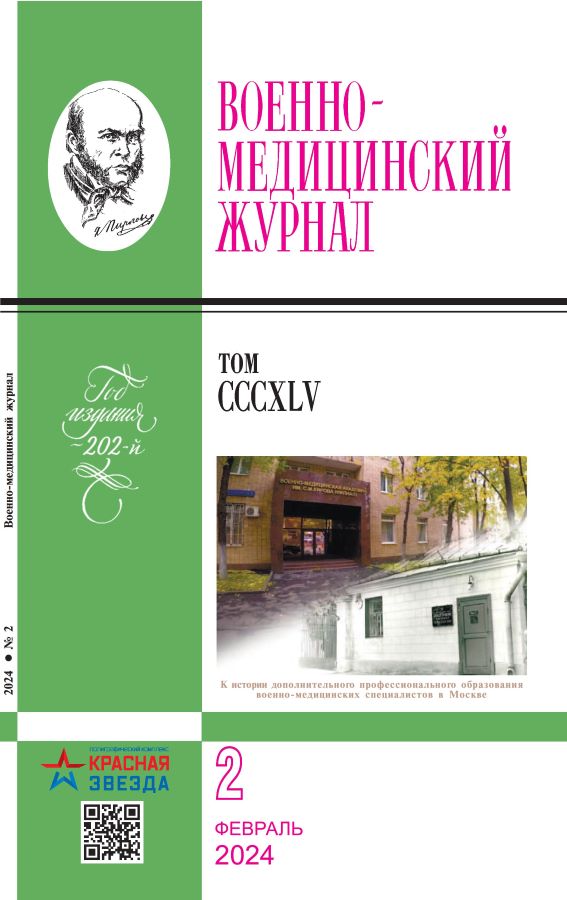Specific indication of biological agents: current state and development prospects
- Authors: Myasnikov V.A.1, Tyunin M.A.1, Chepur S.V.1, Stepanov N.N.1, Azarov I.I.2, Nikishin A.S.1, Alekseev A.N.3
-
Affiliations:
- State Scientific Research Testing Institute of Military Medicine of the Ministry of Defense of the Russian Federation
- Main Military Medical Directorate of the Ministry of Defense, of the Russian Federation
- Department of Advanced Interspecific Research and Special Projects of the Ministry of Defense of the Russian Federation
- Issue: Vol 345, No 2 (2024)
- Pages: 19-27
- Section: Emergency medicine
- URL: https://journals.eco-vector.com/0026-9050/article/view/627328
- DOI: https://doi.org/10.52424/00269050_2024_345_2_19
- ID: 627328
Cite item
Abstract
The article shows the relevance of the revision of all components of the existing biological protection system, one of the key links of which is the specific indication of biological agents. A review of the current state and main characteristics of specific indicating devices used to equip the medical service of the Armed Forces of the Russian Federation is carried out, the basic requirements for promising models are summarized, and some directions for their development are presented. The need to introduce a method of expert assessments was discussed, for which chromatography-mass-spectrometric analysis was proposed, providing qualitative and quantitative determination of all types of biological damaging agents in various types of samples. Based on the results of an analysis of the characteristics of research methods, recommendations were formulated for equipping the relevant units of the medical service with means of analysis and for building logistics for transferring samples between them.
Full Text
About the authors
V. A. Myasnikov
State Scientific Research Testing Institute of Military Medicine of the Ministry of Defense of the Russian Federation
Author for correspondence.
Email: gniiivm_2@mil.ru
кандидат медицинских наук, полковник медицинской службы
Russian Federation, St. PetersburgM. A. Tyunin
State Scientific Research Testing Institute of Military Medicine of the Ministry of Defense of the Russian Federation
Email: gniiivm_2@mil.ru
кандидат медицинских наук, подполковник медицинской службы
Russian Federation, St. PetersburgS. V. Chepur
State Scientific Research Testing Institute of Military Medicine of the Ministry of Defense of the Russian Federation
Email: gniiivm_2@mil.ru
профессор, полковник медицинской службы
Russian Federation, St. PetersburgN. N. Stepanov
State Scientific Research Testing Institute of Military Medicine of the Ministry of Defense of the Russian Federation
Email: gniiivm_2@mil.ru
кандидат биологических наук, полковник
Russian Federation, St. PetersburgI. I. Azarov
Main Military Medical Directorate of the Ministry of Defense, of the Russian Federation
Email: gniiivm_2@mil.ru
кандидат медицинских наук, полковник медицинской службы
Russian Federation, MoscowA. S. Nikishin
State Scientific Research Testing Institute of Military Medicine of the Ministry of Defense of the Russian Federation
Email: gniiivm_2@mil.ru
старший лейтенант медицинской службы
Russian Federation, St. PetersburgA. N. Alekseev
Department of Advanced Interspecific Research and Special Projects of the Ministry of Defense of the Russian Federation
Email: gniiivm_2@mil.ru
доктор биологических наук, полковник
Russian Federation, MoscowReferences
- Герасимов В.В. Организация обороны Российской Федерации в условиях применения противником «традиционных» и «гибридных» методов ведения войны // Вестн. Акад. воен. наук. – 2016. – № 2 (55). – С. 20.
- Игнатов С.Г., Бикетов С.Ф. Перспективность сочетания различных детекционных технологий для создания индикации целевых ПБА тест-систем, выявляющих патогены с максимальными показателями экспрессности, автономности, чувствительности и специфичности // Бактериология. – 2021. – Т. 6, № 4. – С. 79–83.
- Ильницкий А.М. Стратегия гегемона – стратегия войны // Воен. мысль. – 2023. – № 6. – C. 18–36.
- Итоговый доклад парламентской комиссии по расследованию обстоятельств, связанных с созданием американскими специалистами биологических лабораторий на территории Украины. – 2023. URL: http://www.mid.ru/ru/foreign-policy/international-safety/1873584/ (дата обращения: 02.09.2023).
- Митева О.А., Юдина Н.С., Мясников В.А. и др. Анализ современных методик и средств выявления и идентификации микробных токсинов, ингибирующих синтез белка в клетке // Вестн. Рос. воен.-мед. акад. – 2022. – Т. 24, № 1. – С. 143–154.
- Никитин М.Ю., Щелгачев В.В. Опыт разработки и внедрения средств специфической индикации биопатогенов различной природы // Воен.-мед. журн. – 2023. – Т. 344, № 1. – C. 71–77.
- Специфическая индикация патогенных биологических агентов: Практическое руководство / Под ред. Г.Г.Онищенко. – М.: ЗАО «МП Гигиена». 2006. – 288 с.
- Тришкин Д.В., Калачев О.В., Крайнюков П.Е. и др. Особенности деятельности медицинской службы Вооруженных Сил Российской Федерации в условиях «гибридных» войн // Воен. мысль. – 2021. – № 7. – C. 67–77.
- Юдина Н.С., Астафьева О.В., Лукша В.В. и др. Современные методы качественного и количественного анализа зоотоксинов в рамках фармакокинетических исследований // Материалы Третьей Всероссийской научной конференции «Токсикология и радиобиология XXI века», г. Санкт-Петербург, 2023. – Т. 24. – С. 771–802.
Supplementary files













